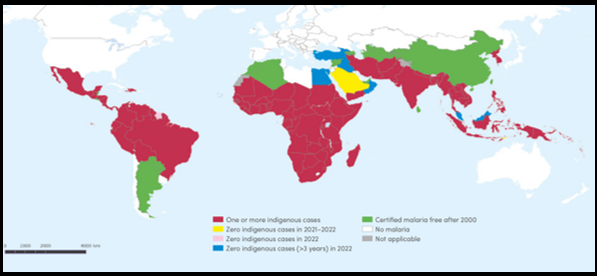| Date: 28 October 2024 | Position: N/A |
|
Location: Egypt |
|
Event
On 20 October 2024, the World Health Organisation (WHO) certified Egypt a malaria-free country. This declaration follows over 100 years of work by Egyptian Governments to end the existence of the disease which has been present in the country for centuries.
Fig1. Prevalence of Malaria by Country in 2023
Background. According to the WHO, Egypt has consistently had zero indigenous malaria cases since 2000. Egypt did experience a limited outbreak of Plasmodium vivax with 21 confirmed cases from May to June 2014, the last known malaria outbreak in the country. After experiencing major malaria outbreaks in 1943 and 1969, the Egyptian Government embarked on a comprehensive public health prevention system. The country’s medical facilities are now said to be well equipped to deal with any future imported cases, despite this, Egypt’s health system still retains a relatively low score of 28 on the Global Health Security Index. The UK Foreign Office and the US Department of State do not list the risk of malaria transmission in their travel advice concerning Egypt.
Comment. According to the WHO World Malaria Report 2023, around 70% of the global malaria burden is concentrated in 11 countries, Burkina Faso, Cameroon, the Democratic Republic of Congo, Ghana, India, Mali, Mozambique, Niger, Nigeria, Uganda and Tanzania. The risk posed by malaria remains most severe in Sub-Saharan Africa and Central and South America, with parts of the Indo-Pacific region and East Asia maintaining a moderate prevalence of cases. Factors such as diminishing economic growth in some severely affected countries as well as the long-term effects of the Covid-19 pandemic has led the WHO to revise its 2025 Global Technical Strategy (GTS) objectives. From a baseline of 2015, the GTS called for a reduction in malaria cases and mortality rate of at least 75% by 2025 and 90% by 2030, the WHO now concludes that if current rates continue, it is unlikely these targets will be achieved globally.

